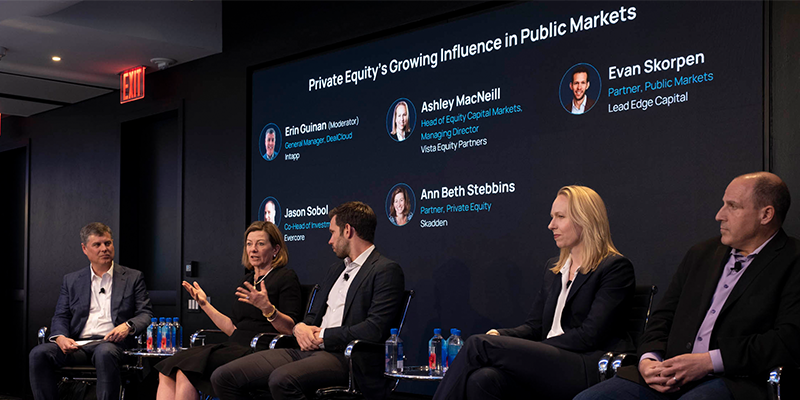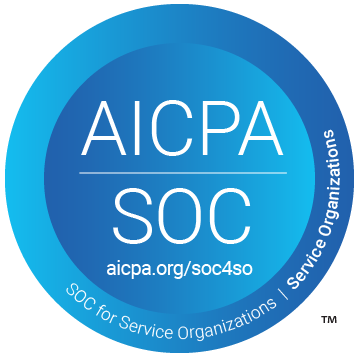Navigating the Public-Private Divide: Insights from Industry Leaders at the Board Leadership Forum
June 21, 2024
Morgan Zombolas

The intersection of private equity and public markets has become increasingly prominent in recent years, shaping the landscape of corporate finance and investment strategies. At our 2024 Board Leadership Forum, industry leaders gathered to delve into this topic, shedding light on the dynamics, trends, and challenges in this evolving space.
Moderated by Erin Guinan, General Manager, DealCloud at Intapp, the panel featured esteemed professionals from various sectors:
- Jason Sobol, Co-Head of Investment Banking at Evercore
- Ann Beth Stebbins, Partner, Private Equity at Skadden
- Evan Skorpen, Partner at Lead Edge Capital
- Ashley McNeill, Head of Equity Capital Markets, Managing Director at Vista Equity Partners
Current Market Conditions and Driving Factors
Erin: What are the current market conditions and what are the specific factors in the market today that are leading to more of these public-to-private transactions?
Ashley: Obviously there's a valuation disconnect. That's the biggest driver of the take private theme and the normalization of these valuations and of the business. I think there's also a big push right now after a big period of dislocation where the cost of capital dramatically changes, like we saw from 21 to today, Management teams, founders and others who get tired of the quarterly reporting metrics and barometers that public investors hold you accountable to. That can become very difficult, particularly as you want to take on other initiatives that don't make sense to public investors at the get-go.
The biggest differential has to do with that timing. Private equity tends to have much longer duration periods than public investors, and you will eliminate that quarterly reporting requirement that oftentimes can impede massive projects, big capital deployment, and frankly, access to capital. I think those are the two main themes driving that.
Evan: There's two countertrends that I think we're seeing. One is it's less fun to be a public company now than it used to be. I think it's a lot harder on boards having to struggle with stock-based comp and capital allocation, and everything is just harder than it was. I think it used to be that it was not fun to be a private company in a private equity portfolio, and it was fun to be a public company. I think that the pendulum has switched to the other way, where a lot of companies are like, "Oof, Vista, please save me." The public markets are hard. I think that's a big trend.
The other countervailing trend I think we're seeing is that a lot of tech companies previously viewed private equity as a lifeline. We're going to stay public as long as we possibly can. At the last minute, when we don't have a succession plan, or we don't have a plan to raise margins, we're going to pull the ripcord right then.
I think the tides have turned, and it is more challenging to get a really great premium on a take-private than it used to be.
Jason: The private-to-private market is harder right now. In fact, the public markets may be easier, because private equity firms want either downside protection – low beta, find good businesses, they can sleep at night, manage capital; or, they want to find alpha – either pay a good price or create some value organically or inorganically or through cost efficiencies. The period of time we've just come through, a lot of really smart investors, Vista being one of the smartest, they've tried to optimize their portfolios. They've had to batten down the hatches, or they've made investments to take market share from a competitor, and they're by definition a little more patient than public. If I'm a private equity firm, there's more likely to be a bid-ask spread between two private equity firms, one who owns a good company that might just want to wait a couple more years to see the markets replay, and maybe there isn't the margin opportunity.
In the public markets, they might have been hamstrung. They might have been hamstrung from making certain investments.
Navigating Market Trends and Legal Considerations
Erin: Then from a legal perspective, what are you seeing as the developments and the interactions between private equity firms and public companies? How can we think about the folks in this room being prepared for what they may face in that type of a transaction?
Ann Beth: As a board, you have to be very, very cognizant of potential conflicts, you have to be very cognizant of the economic incentives. It can be very lucrative for a management team to hitch their wagon to a private equity acquirer.
There've been quite a few cases that have come out of Delaware where those conflicts were not properly managed. The health warning from all lawyers, process, process, process and process really matters in take-private transactions because of, among other things, the potential for conflicts and the real incentive for the first mover or private equity firm to try and lock up the deal while the board still has to get the best price reasonably available and make sure there's a process in place to get the best price reasonably available for shareholders.
Evan: On the private side, we're seeing the secondary market growing tremendously, and I think we've put more capital to work on the private side in secondaries than we have in primary deals for the last year and a half. You have sellers who want liquidity, they want marks, but are willing to deal with a lot of structure. If you figure out what they're optimizing for, you can find a way to structure it so that it works for both sides. I think that's an area you're seeing more.
Discipline, Diversity and Talent
Erin: We see that public companies face an increasing level of scrutiny on a daily basis. How do you think about instilling discipline across the deal teams, the companies, the boards, the sponsors that are involved in these transactions?
Ann Beth: Delaware courts are very, very focused on this right now. As a public company and a public company board, talking about those relationships, it really is incumbent upon the board to make sure that any conflicts are identified, economic incentives for management, make sure that the playing field is level, and that any personal economic incentives of anyone involved in the negotiation or on the deal team are managed, and the board is fully aware of that. There have been recent cases coming out of Delaware that have really shined a spotlight on that.
Impact Investing and ESG
As the panel wrapped up, an audience member posed a question about private equity’s involvement in the housing market and the impact that it's having on DE&I and ESG.
Ann Beth: In defense of private equity sponsors, we are seeing more and more sponsors create impact funds or ESG type of funds that have objectives that are not pure financial objectives. Once I think the PE funds make so much money and the professionals make so much money they want to do good, and so we're trying to find investments that make a difference.
I've seen at least a lot of attention among my clients on those types of investments as well those that would be sitting in a fund that is not just looking at returns but looking at societal returns as well.
Ashley: We have an ESG group and each of our portfolios have to adhere to a standard that is fairly rigorous. Then we also have a community action plan fund. It's a little different because it's hard to say that your deployment of capital in here is resulting in this. We at Vista are exceedingly focused on DE&I and ESG in part because of our founder and in part because it's so deeply embedded in our culture.
Access the full panel recording from the 2024 Board Leadership Forum here.
Contact

Morgan Zombolas
Marketing Program Manager at Equilar
Please contact Belen Gomez at bgomez@equilar.com for more information.
 Roles
Roles











